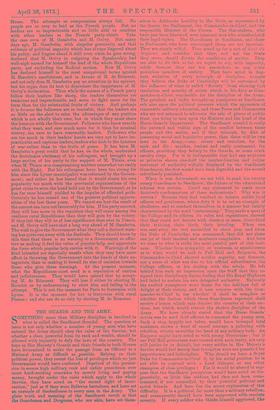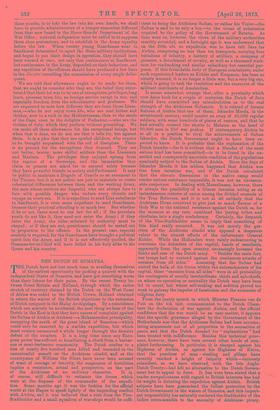THE GUARDS AND THE ARMY.
SOMETHING more than Military discipline is involved in what is called the Sandhurst Scandal. The question at issue is not only whether a number of young men who have entered the Army should obey the rules of the Service, but whether a class, powerful from its rank and wealth, should be allowed with impunity to defy the laws of the country. The boys in Her Majesty's Guards and their friends in both Houses have determined to make the passage from an Officers' to a National Army as difficult as _possible. Relying on their political power, they resent the loss of privileges which no just Government would have conferred. Deprived of the permis- sion to secure high military rank and unfair precedence over more hard-working comrades by merely living and paying money, brought under the rules which apply to the whole Service, they have acted on "the sacred right of insur- rection," just as if they were Bellevue battalions, and have set an example of disobedience to every man in the Army. The plain truth and meaning of the Sandhurst revolt is that the Guardsmen and Dragoons, who are akin, have set them-
selves in deliberate hostility to the State, as represented by the Queen, the Parliament, the Commander-in-Chief, and the responsible Minister of the Crown. The Gas-stokers, who have just been liberated, were ignorant men who miscalculated their legal rights. The Guardsmen at Sandhurst, and those in Parliament who have encouraged them, are not ignorant. They are simply wilful. They stand up for a sort of drat du Seigneur, and consider that they, and not the State they serve, should dictate the conditions of service. They are able to do this, so far, we regret to say, with impunity, solely because they are not gas-stokers or any other powerless members of society. They have acted in flag- rant violation of every principle of discipline, because they believe the Duke of Cambridge will be restrained by the influence of what is called 'Society" from showing that resolution and severity of action which is his duty as Com- mander-in-Chief, responsible for the discipline of the Army. The petulant and badly brought-up youngsters at Sandhurst rely also upon the political pressure which the opponents of reasonable military education, and those Peers and Commoners who are not ashamed to advocate the sale of places of public trust, can bring to bear upon the Minister and the head of the Horse-Guards' Department. The Sandhurst scandal is really the outward and visible sign of the conflict between these people and the nation, and if they triumph, by dint of possessing social and legislative power, then there will be two laws in the Army,—one, severe and resistless, for the rank and file ; another, lenient and easily contemned, for officers, providing they belong to the Guards, or some crack cavalry corps. For it is indisputable that had any serjeants or privates shown one-half the insubordination and vulgar contempt of authority wilfully displayed by the Sandhurst Guardsmen, the first would have been degraded and the second relentlessly punished.
When it was determined, we are told, to send the twenty young Guardsmen to Sandhurst, the failure of the educational scheme was certain. Could any statement be made more decisively condemnatory of these malcontents ? Why was it certain ? Because they bad resolved to behave unlike loyal officers and gentlemen, whose duty it is to set an example of obedience, and to conduct themselves in a manner but faintly characterised by the word "unbecoming." They made a sport of the College and its officers, its rules and regulations, showed that they could not behave with decency at mess, discredited their training, their birth, their breeding. When one was sent away, the rest assembled to cheer him, and when the Duke of Cambridge was summoned, they did not abate one jot of their insolent and mutinous complaints. And here we come to what is really the most painful part of this busi- ness. Whether from sympathy, or weakness, or sensitiveness as to what would be said in Pall Mall and Belgravia, the Commander-in-Chief showed neither sagacity, nor firmness, nor a sense of what was due to his official subordinates, the College officers, in his dealing with the rebels. He left behind him such an impression upon the Staff that they re- signed their disciplinary duties, feeling that His Royal Highness had failed to sustain his own delegated authority. Naturally the exalted youngsters went home for the holidays full of delight at their victory, and it now remains with the Com- mander-in-Chief to say whether it shall be complete or whether the faction which these Guardsmen represent shall receive a lesson which may deprive the country of their ser- vices, but which would restore the shaken discipline of the Army. We have already stated that the Horse Guards' notion was to send field officers to command the young men. Such a step, happily not taken, would have betrayed fatal weakness, shown a want of moral courage, a paltering with rebellion, utterly unworthy the head of any military body. An Emperor might have acted so with young Prastorians ; but if oar Pall Mall prattorians were treated with such lenity, not only will justice be in default, but every soldier in Her Majesty's Service would feel keenly that favourites were not punished for impertinence and indiscipline. Why should we have a Royal Duke for Commander-in-Chief if, by his social position, he is not able to contend with a Lord Abinger, or any other champion of class privileges ? For it would be absurd to sup- pose that the Sandhurst youngsters would have acted so dis- gracefully, so little like soldiers, had they not been coun- tenanced, if not counselled, by their powerful political and social friends. And here lies the secret explanation of this difficulty. It is a political, far more than a military rebellion, and consequently should have been suppressed with resolute severity. If every soldier who thinks himself aggrieved, like these youths, is to take the law into his own hands, we shall have to provide administrators of a temper somewhat different from that now found in the Horse Guards' Department of the War Office ; national indignation must be called in to suppress these class pretensions, and to establish in the Army equality
before the law. When twenty young Guardsmen went to Sandhurst determined to upset the State military institutions, and began to put their design in operation, they should have been warned at once, not only that continuance at Sandhurst, but continuance in the Army, depended on their behaviour, and any repetition of the offences should have produced a few lines in the Gazette cancelling the commission of every single delin- quent.
We are told that allowances ought to be made for them, that we ought to consider who they are, the belief they enter- tained that their lot was to be one of exemptions, privileges, long leave, pleasant town life, no foreign service except in war, and especially freedom from the schoolmaster and professor. We are requested to note how different they are from those Lines- men,—who do not enjoy town life, who are sent hither and thither, now to a rock in the Mediterranean, then to the sands of the Cape, anon to the delights of Peshawur,—who are the victims of duty, which they perform without grumbling. We can make all these allowances for the exceptional beings, but when that is done, we do not see that it tells for, but against them. It is a plea that they are spoiled children, who require to be brought acquainted with the rod of discipline. There is no ground for the exemptions they demand. They are not better, braver, more skilful soldiers than the Linesmen and Marines. The privileges they enjoyed sprang from the caprice of a Sovereign, and the immunities they claim or possess are asked for or secured solely because they have powerful friends in society and Parliament. It may be politic to maintain a Brigade of Guards as an ornament to the Throne, but it is not politic nor just to maintain or create substantial differences between them and the working Army, the men whose services are Imperial, who are always face to face with possible danger, who endure every climate and voyage on every sea. If it is expedient to send Line subalterns to Sandhurst, it is even more expedient to send Guardsmen, because their practical schooling is so much less. But whether it be or not, there must be one law for all ; if the porcelain youth do not like it, they need not enter the Army ; if they enter the Army, the rules ordained by authority must be obeyed ; or if they are not, punishment should be meted out in proportion to the offence. In the present case, especial severity is required, for the Guardsmen have brought a political spirit into the Army, and if it is not effectively quelled, the Commander-in-Chief will have failed in his duty alike to his Queen and his country.



































 Previous page
Previous page